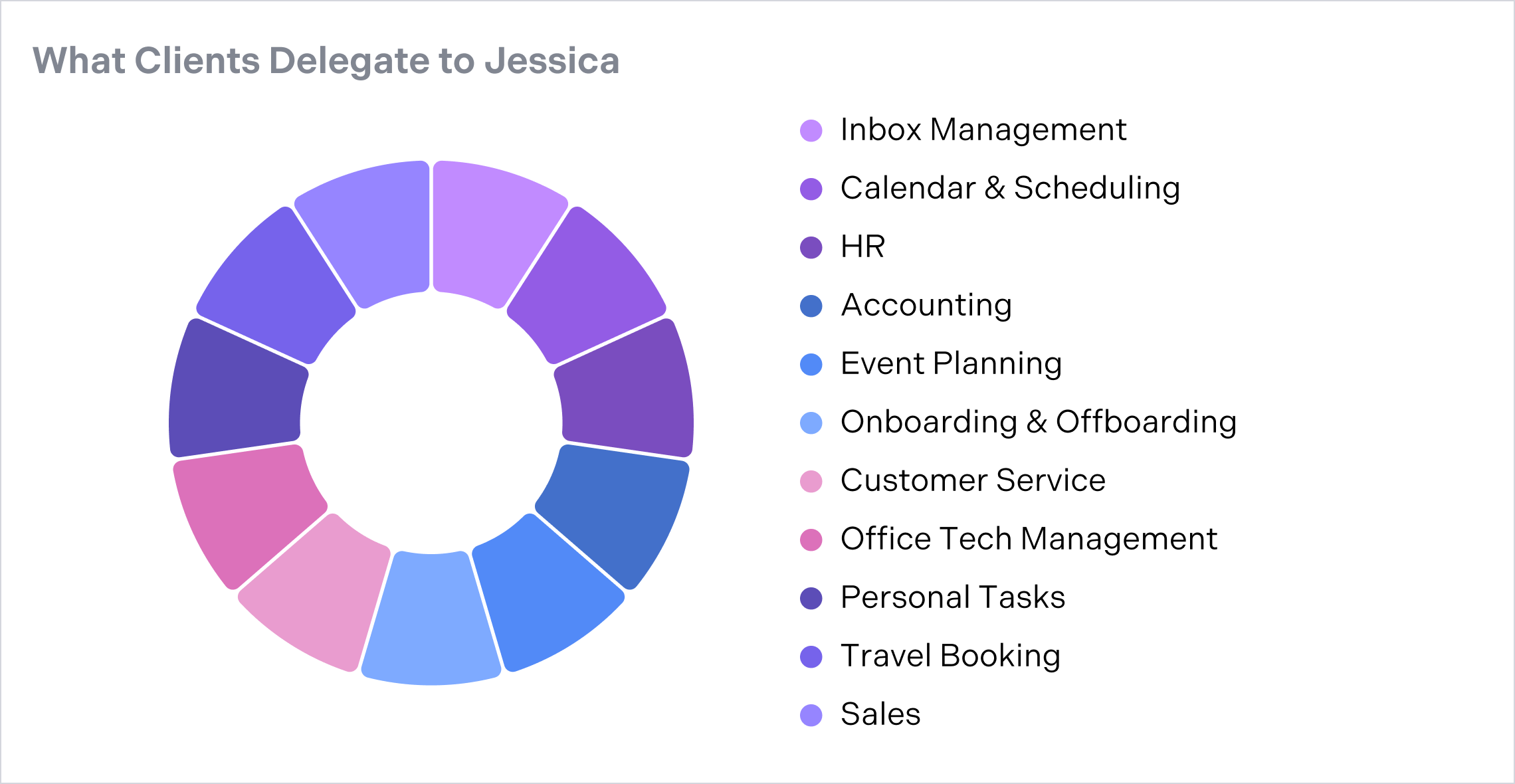Our customers have shared their success stories of delegating with Double, but what about the assistant’s side of the story?
We sat down with one of our veteran executive assistants, Jessica Knight, to learn about her process, her relationships with clients, and how she helps save her teams money, time, and stress.
Supporting Teams and Building Trust
Jessica has been with Double for three years, and she supports three teams and 12 executives at once. That sounds like a tall order, but Jessica has two decades of experience that help her get things done for her teams.
When we asked her what she likes about her job, she told us:
I just love helping people. And for the ones I've been with for a long time, which is most of them, I feel like I'm pretty much part of the team now.
She also describes how fascinating it is to watch the trust grow with clients: “Whenever I start, we begin to build trust. And then it's to the point where I'm doing the craziest things. They're like, ‘Just give it to Jessica, she'll handle it.’ So my job is never boring.”
We were able to chat with one of her clients, Andy, the owner of a talent agency. Andy shared his thoughts on his experience working with Jessica:
“She was the missing link to my success –– thank heaven we found her! Jessica is my Swiss Army knife that I will never lose or give away. She has changed my life in every way for the better. Jessica continues to transform my work-life and home-life balance. She has been such a rock and continues to go out of her way to keep me focused and on task where I need it most. Jessica is so good at anticipating what we need with our business that she is almost psychic. She’s so essential to what we do; she is such an asset to our team.”
What Can You Delegate To An Assistant?
We asked Jessica about how she spends her days and what her clients delegate to her. The variety of tasks she works on is quite impressive.
For most clients, she handles their inbox and scheduling responsibilities. But her task list only grows from there. When describing what she handles for an environmental management software client, for example, she told us: “[I help with] HR, I do their onboarding, their offboarding, any kind of tech setup. And also accounting. I do all the signing into the tax websites, making payments quarterly. I do all their receipt management at the end of every month. And then I do some personal tasks for them as well.”
She also helps with event planning, customer service, sales, and travel planning. One year, she was in charge of booking 116 flights across teams!

Fun fact: Jessica once booked an alligator for a music video shoot as part of her assistant duties!
Delivering Value to Teams
Jessica believes her biggest contributions as an assistant come in three main categories:
- Time Saved
- Money Saved
- Reduced Stress
One particular example came to her mind that she shared with us:
I do a client’s accounting every month, and an auto payment went in for $19,000 for an annual membership. It was for an employee who no longer worked there. But I was able to reach out and we just had to show that he no longer was with the company, and the vendor refunded it. I count that as a success.
There was also a time when she jumped in to help one of her teams with a big customer service project:
One of my clients unfortunately lost a pretty large customer, and they had to offboard them right at the holidays. It was something that was very time-sensitive, and the customer service team was really stressed out about it. So I was able to help with that. And now they call me the honorary customer service team member.
While these examples are impressive, Jessica emphasized, “I feel like I have small successes every day.” Those small successes add up to big savings in money, time, and stress for her executives down the road.
Best Practices for Delegating and Developing Strong Bonds
When it comes to healthy delegating, Jessica believes that proactive communication, strong time management skills, and flexibility are the ingredients for success. Her approach as an assistant is to balance a routine with an openness for unexpected tasks: “Communication is key. I’ll have my to-do list ready, but I don’t live by it. When I first started, I was like, ‘I got my list; this is what I'm doing today.’ But you're not going to have a routine every day.”
Finally, she shared how fulfilling her role is, especially as she spends more time with her teams.
“As I get closer to them, I become a part of the team every time. It’s special, the bonds that you get with these people that you never are going to meet in person. So, I've enjoyed myself. That's why I have been here for so long with so many executives.”
